 |
- OTHER SERVICES VOICES:
- MARINES
 - NAVY
 - AIR FORCE
 - ARMY
 - COAST GUARD
|
An up close and personal interview with Air Force Veteran and Togetherweserved.com Member:
Sergeant Tim Bailey (USAF 1971-1975)
WHAT PERSUADED YOU TO JOIN THE Air Force?
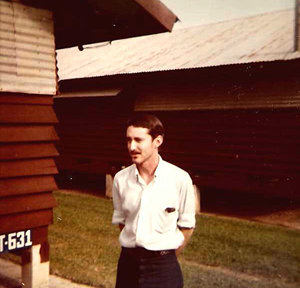 At the time, early in 1971, Vietnam was still on the forefront of every young man’s thinking. I’d graduated high school the previous June 1970, and apart from a summer painting job and whatever weekend work Dad could throw my way, the prospects for a non-college-minded lad were quite dim. My Draft Lottery number was getting lower and lower. I knew military service was a certainty, and I felt I should be the one to choose the branch of the armed services. My decision boiled down to the fact that I wasn’t tough enough for the Marines, I couldn’t swim for the Navy or Coast Guard, and the Army looked like too much walking. Naturally that left the United States Air Force. At the time, early in 1971, Vietnam was still on the forefront of every young man’s thinking. I’d graduated high school the previous June 1970, and apart from a summer painting job and whatever weekend work Dad could throw my way, the prospects for a non-college-minded lad were quite dim. My Draft Lottery number was getting lower and lower. I knew military service was a certainty, and I felt I should be the one to choose the branch of the armed services. My decision boiled down to the fact that I wasn’t tough enough for the Marines, I couldn’t swim for the Navy or Coast Guard, and the Army looked like too much walking. Naturally that left the United States Air Force.
BRIEFLY, WHAT WAS YOUR CAREER PATH?
Let me say first that my “career” was all of four years active duty and two years inactive reserve. It might have lasted longer, but I’ve always been a restless sort. I was volunteered into the 276XO AFSC: Aerospace Control and Warning Systems Operator. I was a “Scope Dope” as we called ourselves. I watch for friend and foe alike using equipment most women and men serving in the Air Force today would regard as quaint. I sat in a darkened operations room watching aircraft on radar, and reporting on their movements.
DID YOU PARTICIPATE IN COMBAT OPERATIONS AND IF SO, WHICH ONES??
Yes and no. I did not carry a weapon in combat, but worked in support of combat operations.
While at McChord AFB, I participated in computerized combat missions; practicing scenarios designed to hone our defensive skills in the event of an aerial attack from the Soviet Union. Raw radar data from several remote sites, filtered through the SAGE (semi-automatic ground environment) computer, and was displayed on our large scopes. During these missions, sets of circumstances were introduced by the computer and each section in SAGE acted upon them in accordance with mission requirements. In the event of an actual incursion by Soviet aircraft, the canned tracks would have been for real, and our actions carrying more dire consequences.
During Vietnam, I was stationed at NKP (Nakhon Phanom Royal Thai Air Force Base); 621st Tactical Control Squadron, Detachment 5, call-sign “Invert.” We never fired a shot in anger, but nearly every friendly aircraft we contacted were directly involved with combat operations of some kind. NKP bordered on Laos, and there were daily Special Operations sorties involved attacking enemy positions along the so-called “Ho Chi Minh Trail”; an amorphous, every-changing line of resupply for the North Vietnamese military. Our position, some 5-7 miles from the Mekong River, kept our defensive components on base constantly on their toes. Rarely a night went by without some kind of activity on our perimeter. Those sudden reports of flare cannons are still with me and make me startle to even a car backfire. Detachment 5, call-sign “Invert.” We never fired a shot in anger, but nearly every friendly aircraft we contacted were directly involved with combat operations of some kind. NKP bordered on Laos, and there were daily Special Operations sorties involved attacking enemy positions along the so-called “Ho Chi Minh Trail”; an amorphous, every-changing line of resupply for the North Vietnamese military. Our position, some 5-7 miles from the Mekong River, kept our defensive components on base constantly on their toes. Rarely a night went by without some kind of activity on our perimeter. Those sudden reports of flare cannons are still with me and make me startle to even a car backfire.
Most memorable was “Linebacker Two,” a massive bombing operation conduct on North Vietnamese targets over the course of 11 days in 1972. I recall pulling 16 hour shifts on scope or behind the vertical, Plexiglas plotting board, as our controllers put attack aircraft onto aerial tankers for pre and post-strike refueling, monitored and advised the “BUFF” cells (B-52 bombers) heading north, and controlled Mig-Cap aircraft who protected our attacking forces. Most of the viewing area on scope to the north and east was blotted out by a combination of electronic and chaff jamming to provide a huge corridor through which our aircraft could approach their targets in Hanoi and elsewhere. Radio transmissions told the story, in brief, of their dangerous and heroic actions over enemy airspace.
No, I was never in combat, but I was there to support and bear witness. I won’t say I was happy to be involved, but I’m still proud of my service.
FROM YOUR ENTIRE SERVICE CAREER WHAT PARTICULAR MEMORY STANDS OUT AS BEING THE ONE WHICH HAS HAD THE LARGEST IMPACT ON YOU?
There were several, both great and small. I recall the flu epidemic that was sweeping through Lackland AFB during my basic training; half our flight came down with it, though none of us were held back. I recall visiting much of the Gulf Region of the U.S. while training at Keesler AFB, Mississippi, and then watching with a lump in my throat years later to the aftermath of Hurricane Katrina. I remember being one of three “one-stripe” Airman at the 25th NORAD REGION/ SAGE block-house at McChord AFB, Washington that were, should I say, “invited” to attend a retirement reception for a colonel, and being surrounded by officers who ranked major and above; talk about feeling out of one’s depth. There are many memories of my service in Thailand, especially how beautiful a region it is. I recall the highs and lows of being part of the 84th Tactical Control Flight at George AFB, California. At the 84th I went to Edwards AFB as part of the early F-15 testing program pitting them against “aggressors” in the role of Soviet Migs; the Migs always lost. I especially remember the convoys with the 84th to remote desert locations for exercises and war games, and the two deuce-and-a-half trucks that had major mechanical failures with me at the wheel; “I’m still sorry Col. Shaw…” Many memories indeed.
DO YOU HAVE A PARTICULARLY FUNNY STORY FROM YOUR SERVICE THAT YOU WOULD LIKE TO SHARE?
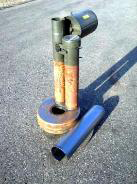 We were on an exercise deployment with a radar unit in a desert location stateside. The whole unit went out for the exercise but for some reason we didn't have a cook so we imported a cook from a sister unit. This guy was straight out of New York City and had never been out in the field a day in his life, but even so he did a great job as cook for this exercise, although he had a difficult time with the immersion heater he needed to use to heat the water for doing the dishes. Getting the thing to light was especially problematic so some of the guys were more than happy to give him some advice. They told him he needed to pump that charging handle 20-30 times to get a good amout of fuel ready to go, then he need to drop in a wadded up piece of paper and then light another wad of paper and drop that in. He did as directed and it certainly worked, that thing sounded like a mortar going off and I've never seen someone get that close to the deck that quickly, that was really funny. We were on an exercise deployment with a radar unit in a desert location stateside. The whole unit went out for the exercise but for some reason we didn't have a cook so we imported a cook from a sister unit. This guy was straight out of New York City and had never been out in the field a day in his life, but even so he did a great job as cook for this exercise, although he had a difficult time with the immersion heater he needed to use to heat the water for doing the dishes. Getting the thing to light was especially problematic so some of the guys were more than happy to give him some advice. They told him he needed to pump that charging handle 20-30 times to get a good amout of fuel ready to go, then he need to drop in a wadded up piece of paper and then light another wad of paper and drop that in. He did as directed and it certainly worked, that thing sounded like a mortar going off and I've never seen someone get that close to the deck that quickly, that was really funny.
WHICH INDIVIDUAL PERSON WOULD YOU SAY HAS HAD THE MOST POSITIVE INFLUENCE ON YOUR AND YOUR CAREER AND WHY?
That would be the late Maj.General Archie M. Burke, commander of the 25th NORAD/Air Division at McChord. Always upbeat, always smiling, and always offering some kind of recognition for those under his command. I especially recall we responded at 3am to a recall for a mission in the block-house. I was running the briefing slides for General Burke (using the old overhead projector with the long control arm making the thing look like a drill press). The General started out his briefing by telling us: “Forty years ago, when I was a boy on the farm in Oklahoma, I vowed I’d never get up this early ever again…Well, what can I tell you, here I am at zero-dark-thirty!”
I was told that Gen.Burke could run the mile and a half in under 9 minutes. He started his career teaching flying and logged countless hours in several types of aircraft. He was a ruddy-faced outdoorsman who was a natural leader. Truly an officer I looked forward to saluting. A salute he cordially returned.
WHAT PROFESSION DID YOU FOLLOW AFTER THE SERVICE AND WHAT ARE YOU DOING NOW?
I did many things to pay bills and keep my wife and me going while attending college using the G.I. bill. Finally graduating from San Jose State University in California, with a B.S. in Criminal Justice Administration, an opportunity arose in Maricopa County Arizona to become a Juvenile Probation Officer. While there, as a member of the Arizona Superior Court, for the County of Maricopa, I supervised kids aged 8 to 18 placed on probation as a result of their having been adjudicated delinquent or incorrigible by the Court. Most of the children passing through our system were really pretty good kids just having more than typical difficulty growing up. A small percentage of them were truly destined for a career in crime, and some of my former clients are still incarcerated.
I left Arizona in late 2001, likely in response to the events of “9-11” in terms of needing to be nearer extended family. By  then I had completed a Master of Counseling degree at Arizona State University, and was able to utilize my clinical skills for a time at a psychiatric hospital in Fargo, North Dakota. As I admitted previously to being a restless sort, I no longer practice counseling, opting, instead, to concentrate on strengthening my family ties. Currently, we are developing some acreage for a little house in northern Minnesota. I took a huge cut in pay by leaving the Court and the counseling profession, and work in logistics for a local Target store. I’m still a counselor, of sorts, because I still find myself offering counsel to co-workers. They seldom know what it is I’m doing, and I don’t get a dime for just being there at the right moment at a time of need. then I had completed a Master of Counseling degree at Arizona State University, and was able to utilize my clinical skills for a time at a psychiatric hospital in Fargo, North Dakota. As I admitted previously to being a restless sort, I no longer practice counseling, opting, instead, to concentrate on strengthening my family ties. Currently, we are developing some acreage for a little house in northern Minnesota. I took a huge cut in pay by leaving the Court and the counseling profession, and work in logistics for a local Target store. I’m still a counselor, of sorts, because I still find myself offering counsel to co-workers. They seldom know what it is I’m doing, and I don’t get a dime for just being there at the right moment at a time of need.
HOW HAS SERVING IN THE ARMED FORCES INFLUENCED THE WAY YOU HAVE APPROACED YOUR LIFE AND CAREER?
I began to grow up in the service. I learned who to emulate and who to avoid being like. I learned what I liked and didn’t like, and to move on when I felt the time was right. I suppose actor Clint Eastwood’s character, Inspector Harry Callahan, in “Dirty Harry,” said it best: “A man’s got to know his limitations.” Serving in the Armed Forces helped me to begin learning my limitations, along with my strengths. My approach to career has always been to show up for work, do the job I was trained to do to the best of my ability, then go home. I don’t seek praise or adulation. I don’t seek rewards other than that pay check. I guess my reward has always been in knowing I did my job, and did it well.
Part of my role as a Juvenile Probation Officer was to instill this ethic in the youngsters, and to encourage them to always be learning and growing. I would certainly encourage young Airmen, enlisted or officers, to strive for that simple work ethic. Especially in the Armed Forces, where often the goal is measured in terms of life or death, knowing what to do, doing it quickly and completely, and in concert with other members of the team, such a work ethic is essential. Somehow the rewards will come because others will see who you are and how you work.
WHAT ADVICE WOULD YOU HAVE FOR THOSE WHO ARE STILL SERVING IN THE MILITARY?
My understanding of today's military is that it's drastically different from what it was in the 70's, especially with regard to opportunities while in the service and educational benefits available to veterans. I would tell anyone who is currently serving to thing long and hard about whether you're going to stay in or get out and no matter what you decide, take full advantage of every opportunity presented to you. You of course have to take the good with the bad, as you do with any endeavor, but be sure to make the most of it while you can. The experience and friendships you gain will stay with you for the rest of your life - make the most of it!
HOW HAS TOGETHERWESERVED.COM HELPED YOU TO MAINTAIN A BOND WITH THE SERVICE AND THOSE YOU SERVED WITH?
During my counseling practicum, I saw a gentleman who’d had some very traumatic events happen to him while serving in Vietnam. Strangely, I felt somewhat uncomfortable during those sessions, not because of hearing the details of the client’s experiences, but because I felt like an outsider. I think that was the beginning of my ownership of the right to be an insider.
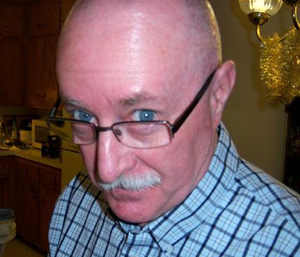 I had avoided talking seriously about Vietnam, or even about my nominal role during my time in service. In my mind, the Vietnam Vets were those guys that were actually in the fire fights, not me. What changed it for me was the terrorist attacks of September 11th and the ultimate involvement of our Armed Forces in Afghanistan and Iraq. I began looking at who was serving and in what capacity. I began to sense that every single member of the Armed Forces is a participant, just as I was in my day. Since then, I’ve been trying to recall as much of those times as I can, and membership in Togetherweserved.com has been a part of it. Yeah, my DD214 says I am entitled to the Vietnam Service and Vietnam Campaign Medals. I am able to admit to being a Vietnam Vet after nearly 40 years! I had avoided talking seriously about Vietnam, or even about my nominal role during my time in service. In my mind, the Vietnam Vets were those guys that were actually in the fire fights, not me. What changed it for me was the terrorist attacks of September 11th and the ultimate involvement of our Armed Forces in Afghanistan and Iraq. I began looking at who was serving and in what capacity. I began to sense that every single member of the Armed Forces is a participant, just as I was in my day. Since then, I’ve been trying to recall as much of those times as I can, and membership in Togetherweserved.com has been a part of it. Yeah, my DD214 says I am entitled to the Vietnam Service and Vietnam Campaign Medals. I am able to admit to being a Vietnam Vet after nearly 40 years!
I never really had any close ties with anyone while in service. Interestingly though, I have made some contacts, with guys who were also stationed at Invert/NKP during or just prior to the time I was there. It is wonderful to view their Shadow Boxes, and see who remained in service through to retirement, and the lives they have led. Fine gentlemen all of them. Funny, but we all seem to be older now!
|
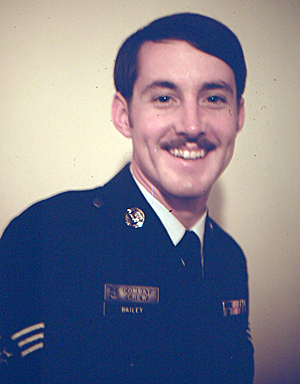
Sgt Tim Bailey
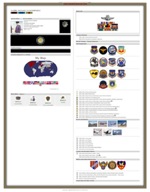
View Sgt Bailey's Shadowbox on TWS

Read Other Interviews in the TWS Voices Archive
|
|
Share this Voices Edition on:


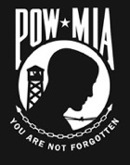
 |
|
TWS VOICES
TWS Voices are the personal stories of men and women who served in the US Military and convey how serving their Country has made a positive impact on their lives. If you would like to participate in a future edition of Voices, or know someone who might be interested, please contact Major Wesley Prater HERE.
This edition of AirForce Voices was supported by:
AirForce.Togetherweserved.com
For current and former serving Members of the United States Air Force, Army Air Corps, Air Force Reserve and Air National Guard TogetherWeServed is a unique, feature-rich resource helping Airmen reconnect with lost Wingmen, share memories and tell their Air Force story.
To join AirForce.Togetherweserved.com, please click HERE.
|
|